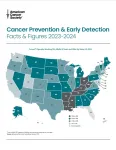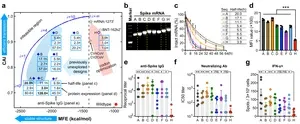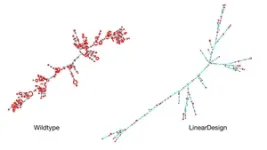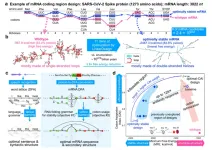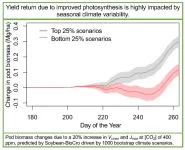(Press-News.org) ATLANTA, May 2, 2023 – In a new report, American Cancer Society (ACS) researchers discovered both favorable and unfavorable changes in major cancer risk factors, preventive behaviors and services, and screenings in the United States during the COVID-19 pandemic. Between 2019 and 2021, current smoking, physical inactivity, and heavy alcohol consumption declined, and human papillomavirus vaccination and stool testing for colorectal cancer screening uptake increased. In contrast, obesity prevalence increased, while cervical cancer screening declined during the same timeframe. Additionally, disparities by racial/ethnic and socioeconomic status persisted.
The findings were released today in the journal Cancer Epidemiology, Biomarkers & Prevention, a publication of the American Association for Cancer Research, as well as in the biennial ACS report Cancer Prevention and Early Detection Facts & Figures, 2023-2024. The review is one of the only sources that looks at major modifiable cancer risk factors, HPV and HepB vaccinations, and cancer screening test use.
“These latest findings give us a mixed bag concerning progress in the fight to help reduce the cancer burden in adults in the U.S.,” said Dr. Priti Bandi, scientific director, cancer risk factors & screening surveillance research at the American Cancer Society and co-author of the study. “As more years of data are collected, it will be clearer whether these contrasting changes are transient or not.”
For the study, ACS researchers analyzed data from the National Health Interview Survey, the Behavioral Risk Factors Surveillance System, and the National Immunization Survey to study changes in major modifiable cancer risk factors, preventative behaviors, and screenings during the COVID-19 pandemic from 2019-2021.
Forty-five percent of the 609,820 cancer deaths to occur in the U.S. in 2023 are expected to be attributable to modifiable cancer risk factors, such as cigarette smoking, excess body weight, alcohol intake, physical inactivity, unhealthy diet, and obesity, and potentially, all avoidable through lifestyle changes. Cancer screening tests can further prevent thousands of additional cancer cases and deaths.
Findings showed Improvements in select cancer risk factors and screenings:
Cigarette smoking prevalence in adults declined from 14% in 2019 to 12% in 2021, an estimated 5.7 million decline in the number of adults who currently smoke. By state, smoking prevalence between 2019 and 2021 declined in 17 of 50 states and the District of Columbia.
Physical inactivity prevalence among adults declined from 26% in 2019 to 23% in 2021, or an estimated 3.2 million fewer persons reporting physical inactivity.
Heavy alcohol consumption prevalence among adults declined from 7% in 2019 to 6% in 2021, or an estimated 1.4 million fewer persons reporting heavy drinking.
Prevalence of home-based stool testing for colorectal cancer increased from 7% in 2019 to 10% in 2021, which translated to an estimated additional 3.6 million persons.
There were also unfavorable trends reported:
The median obesity prevalence across U.S. states increased from 32% to 34%. Obesity prevalence in adults increased in 18 of the 50 states and remained unchanged in the remaining states.
Recommended fruit consumption in adults declined from 30% in 2019 to 29% in 2021, which translated to an estimated decline of 4.5 million adults reporting recommended fruit consumption.
Up-to-date cervical cancer screening declined amongst eligible women from 75% in 2019 to 73% in 2021.
Yet, disparities by racial/ethnic and socioeconomic status persisted:
Persons with less than a high school education did not experience any changes in smoking prevalence or quit ratio between 2019-2021, further entrenching persistent socioeconomic disparities in smoking. Lower educated persons (<HS, HS/GED educated) are between 4 to 5 times more likely to smoke than college-educated persons in 2021.
Uninsured persons are between 28% to 60% less likely to be up to date with recommended cancer screenings compared to privately insured persons in 2021, with the largest disparity for colorectal cancer and breast cancer screenings. This access disparity persisted at similar levels since 2019.
“Ongoing efforts to reduce modifiable risk factors and improve receipt of screening are warranted,” said Dr. Ahmedin Jemal, senior vice president, surveillance and health equity science at the American Cancer Society and senior author of the study. “We also must target our interventions among individuals of racially/ethnically diverse groups and socioeconomic position who continue to be greatly affected by cancer.”
“The pandemic put a spotlight on the criticality of maintaining health and access to free preventive services, including cancer screening, HPV vaccination, and tobacco cessation is more important than ever,” said Lisa A. Lacasse, president of the American Cancer Society Cancer Action Network, ACS’s advocacy affiliate. “We urge lawmakers at all levels of government to protect and advance policies that prioritize cancer prevention.”
Jessica Star is lead author of the report. Other ACS researchers contributing to the study include: Dr. Farhad Islami, Dr. Nigar Nargis, Dr. Robin Yabroff, Adair Minihan, and Dr. Robert Smith.
# # #
About the American Cancer Society
The American Cancer Society is a leading cancer-fighting organization with a vision to end cancer as we know it, for everyone. For more than 100 years, we have been improving the lives of people with cancer and their families as the only organization combating cancer through advocacy, research, and patient support. We are committed to ensuring everyone has an opportunity to prevent, detect, treat, and survive cancer. To learn more, visit cancer.org or call our 24/7 helpline at 1-800-227-2345. Connect with us on Facebook, Twitter, and Instagram.
END
A team of researchers from Baidu Research has developed an AI algorithm that can rapidly design highly stable COVID-19 mRNA vaccine sequences that were previously unattainable. The algorithm, named LinearDesign, represents a major leap in both stability and efficacy for vaccine sequences, achieving a 128-fold increase in the COVID-19 vaccine’s antibody response.
“This research can apply mRNA medicine encoding to a wider range of therapeutic proteins, such as monoclonal antibodies and anti-cancer drugs, promising broad applications and far-reaching impact,” said Dr. He Zhang, Staff Software Engineer ...
A team from the University of Illinois has modeled improving photosynthesis through enzyme modification and simulated soybean growth with realistic climate conditions, determining to what extent the improvements in photosynthesis could result in increased yields.
“There’s a complex relationship between photosynthesis improvement and actual yield, having higher photosynthesis doesn’t necessarily mean you have higher yield. The yield return is highly impacted by seasonal climate conditions” said Yufeng He, a postdoctoral researcher at Illinois, who led this work for a research project called Realizing Increased ...
“[...] AI-powered algorithms, such as PandaOmics, may accelerate subsequent gene target discovery not only for GBM but for a broader range of age-associated diseases.”
BUFFALO, NY- May 2, 2023 – A new research paper was published in Aging (listed by MEDLINE/PubMed as "Aging (Albany NY)" and "Aging-US" by Web of Science) Volume 15, Issue 8, entitled, “Identification of dual-purpose therapeutic targets implicated in aging and glioblastoma multiforme using PandaOmics - an AI-enabled biological target discovery platform.”
Glioblastoma Multiforme (GBM) is the most aggressive and most ...
Montreal — The North American Commission for Environmental Cooperation (CEC) today released a new report compiling and analyzing data reported by approximately 24,000 industrial facilities in Canada, Mexico and the United States to their respective national pollutant release and transfer registers. The report reveals important gaps in the reporting and tracking of transfers to disposal across the region due to differing reporting requirements, shared responsibilities across agencies and jurisdictions, and the lack of information about the fate of waste pollutants when they are transferred to third parties (such as waste management service providers) or across national ...
Cedars-Sinai Cancer welcomes Karine Sargsyan, MD, formerly director of one of the world’s largest clinical biobanks, as scientific director of its OncoBiobank. Sargsyan is charged with leading biobank development and creating new strategies for the optimal deployment and use of the Cedars-Sinai Cancer Molecular Twin Precision Oncology Platform for both research and clinical practice. She will work collaboratively with Nicholas Tatonetti, PhD, associate director of Computational Oncology, on the ...
ITHACA, N.Y. - In an effort to make textiles more sustainable, a new method allows researchers to break old clothing down chemically and reuse polyester compounds to create fire resistant, anti-bacterial or wrinkle-free coatings that could then be applied to clothes and fabrics.
The proof-of-principle study provides hope for unsustainable textile, apparel and footwear industries that together generate 20% of global solid waste. Many so-called recyclers end up illegally dumping textiles as trash in countries in Asia and Africa.
“We think that our clothes are recycled or reprocessed, but most ...
Joyful music could be a game changer for virtual reality headaches
Listening to music could reduce the dizziness, nausea and headaches virtual reality users might experience after using digital devices, research suggests.
Cybersickness – a type of motion sickness from virtual reality experiences such as computer games – significantly reduces when joyful music is part of the immersive experience, the study found.
The intensity of the nausea-related symptoms of cybersickness was also found to substantially decrease with both joyful and calming music.
Researchers from the University of Edinburgh assessed the effects of music ...
LAWRENCE — Governments and private contractors work together on countless functions, but when something goes wrong, who is to blame?
Zach Mohr, associate professor of public affairs & administration at the University of Kansas, is involved in a series of studies to examine how people determine blame and hold those in power accountable.
While research has shown deaths in prisons have increased in recent years, there is little public data available about how those deaths occur in specific ...
A University of Missouri School of Medicine researcher examining the circumstances behind pediatric firearm assaults found that most child shooting victims were shot outdoors for unknown reasons and were likely not intentionally targeted.
Firearm injuries surpassed motor vehicle accidents as the leading cause of child deaths in 2020. Assault has become the most common cause of firearm injury among American children and adolescents, surpassing firearm suicide and accidental firearm injuries. However, very little research exists examining the circumstances ...
About The Study: Over the last 10 years, the proportion of pediatric emergency department visits for mental health reasons have approximately doubled, including a 5-fold increase in suicide-related visits. These findings underscore an urgent need to improve crisis and emergency mental health service capacity for young people, especially for children experiencing suicidal symptoms.
Authors: Greg Rhee, Ph.D., of the University of Connecticut School of Medicine in Farmington, is the corresponding author.
To access the embargoed study: Visit our For The Media website at this ...
